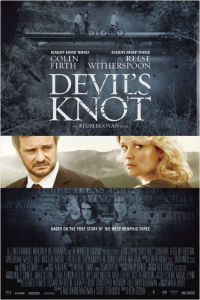film review: devil’s knot
A dark, fuck-off wood in Arkansas. Shadows lick at a rusty pipe; ripples slowly spread across the water; mist creeps in on a silent bog. A child begins to sing: the music is ever so slightly out of tune. Just one minute in and I started to feel that maybe I shouldn’t have asked my parents to spend their peachy Sunday arvo watching Devil’s Knot. When the satanic rituals came in, I was sure. Their faces drained of more blood than the mangled corpse on-screen, it was a precious parent-daughter bonding moment I’ll never forget.
Devil’s Knot (2013), directed by Atom Egoyan, aims to disturb. Though initially well executed, by its close the audience is left more confused than anything else.
The film relays the macabre true story of the ‘West Memphis Three’ murders; in 1993 Arkansas, three eight-year-old boys were mutilated and killed in the woods. Devil’s Knot focuses on the subsequent investigation and trial of three teenage men accused of the crime. The film follow Ron Lax (Colin Firth), lead investigator for the defence, as he uncovers the flaws in the case against them, and seeks the truth of who really murdered the West Memphis boys.
Walking the footsteps of Arthur Miller’s famous play, The Crucible, Egoyan uses this true story to reveal harsh truths about human nature. As in the Salem witch trials, the West Memphis case saw innocent people (the three accused) arbitrarily scapegoated to reinstate a sense of security and control within the community, and to reinforce the power of authorities. With evidence fabricated against them and all else hidden or destroyed, the three teenagers were demonised by the press and authorities. Highlighting religious persecution, the corruptibility of the justice system, the hypocrisy of capital punishment and humans’ seeming preference for order over compassion, Egoyan pulls no punches in criticising how the West Memphis case was handled.
Pam Hobbs (Reese Witherspoon), grieving mother of one of the murder victims, serves as the centrepiece of this criticism. Initially incensed against the accused, she later becomes suspicious of the injustice occurring and finally realises that the true murderer may be closer to her than she had ever imagined. Hobbs’ questioning prompts us to consider our own capacity to cause great harm, and the sometimes arbitrary way in which we distinguish right from wrong. If extreme emotions like grief and anger can drive a whole town to blood lust for innocent people, are we any better than the murderers? Through provoking such questions, Devil’s Knot reveals the latent monster within us all.
Viewers may lose sight of these questions however, as the film’s haphazard construction creates confusion. Starting as a mystery-horror film, Devil’s Knot quickly descends into a court room drama. Leads on the murder case are pursued one moment and dropped the next with little and sometimes no warning, explanation or follow up. This is particularly problematic given the large number of people the film investigates. If executed with more structure, this may have been an effective method of showing viewers that the truth, in this case, is inaccessible. But as it stands, the effect is jarring. Devil’s Knot ultimately falls in a pile of text which hopes to tie the whole thing together, but only reinforces the feeling that this film is ‘incomplete’.
Where feminism’s concerned, Devil’s Knot takes no great strides. Witherspoon’s character is for the most part dependent on her stronger husband (Alessandro Nivola). Though she later shows insight and bravery, her character remains the only female lead.
Women fare better than racial minorities, however. The one black man featured in this film is the most logical suspect in the murder case. You never hear him speak, only see his blood-smeared body drag his muddied boots into the women’s bathroom of a local diner, to the horror of its innocent, white patrons.
Though it raises some talking points, Devil’s Knot is never untied, generating confusion, frustration, and deeply traumatising my parents. The film makes a lot of promises which are never delivered, and brings little new to an old conversation.


